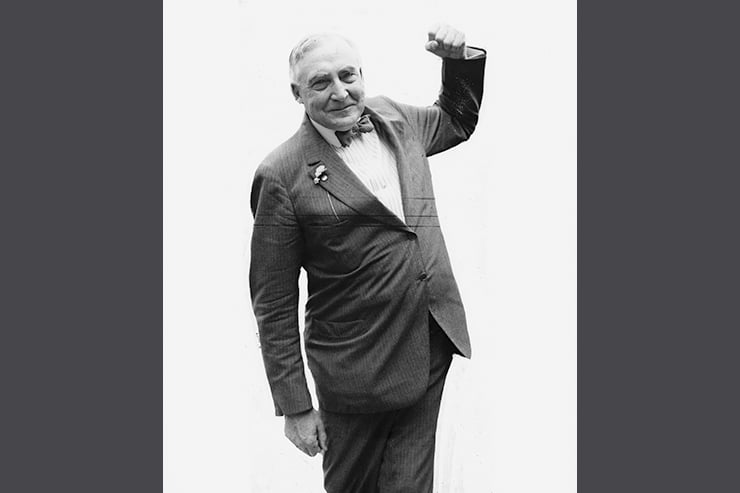Mark Twain said history doesn’t repeat but it rhymes. The life of Warren G. Harding rhymes with the presidential politics of our time.
Harding died 100 years ago this week—Aug. 2, 1923. Historians often rank him among America’s worst presidents. Yet this says more about them than it does about Harding. He had mistresses, but so did John F. Kennedy, and Harding didn’t perjure himself to cover his improprieties, like Bill Clinton. Harding did father a child that he refused to acknowledge, much as Joe Biden refused to acknowledge his son Hunter’s illegitimate daughter until last week.
In terms of sex scandals, however, Harding today seems all too typical, rather than an egregious departure from the integrity of the presidential office. Certainly historians don’t dwell on the infidelities of presidents they consider great, such as Franklin Roosevelt, and if they can’t ignore JFK’s or Clinton’s philandering, they nonetheless don’t judge their presidencies on their sex lives. Why do they treat Harding differently?
Harding was different—not in his extracurricular misbehavior, but in his politics and party affiliation. Harding was a conservative Republican, and a beloved one, too. He won the 1920 election with more than 60 percent of the popular vote, a record up to that time that has since been surpassed only by FDR in 1936, Lyndon Johnson in 1964, and Richard Nixon in 1972.
Unlike Johnson and Nixon, Harding maintained his popularity during his lifetime; his death a little more than three years into his term was an occasion of momentous national mourning. He died while on a speaking tour of the West, and grieving Americans lined the railroad tracks as Harding’s body was taken from California to Washington, D.C.
Harding was known for his ability to get along with everyone; his likeability propelled him from relative obscurity to the Republican presidential nomination in 1920, when the party deadlocked between more prominent and polarizing candidates at its national convention. The backroom dealmaking that led to Harding’s selection by the party’s powerbrokers gave rise to a term that’s still part of American politics: “the smoke-filled room.”
But Harding’s popularity wasn’t all about his demeanor; it was also because of his program and its contrast to that of the previous administration, Woodrow Wilson’s. Harding campaigned on what he called “a return to normalcy” after the upheavals of World War I.
Normalcy meant reining in federal spending, and Harding established what became the Office of Management and Budget in the White House. Normalcy also meant a restoration of civil liberties. Wilson’s administration jailed critics of the war, including socialist leader Eugene V. Debs, who ran for president in 1920 while serving a 10-year prison term. Harding commuted Debs’ sentence—and invited him to the White House. That same day, Harding commuted the sentences of 23 others jailed by Wilson as well.
Academic historians have a bias toward Democrats and toward war presidents. Thus, despite his role in promoting segregation in the federal government, Woodrow Wilson continues to draw favorable ratings from presidential historians, who ranked him 13th in C-SPAN’s 2021 Survey of Presidential Leadership.
Harding was down at 37, as little helped by his support for federal anti-lynching legislation as Wilson was hurt by his segregationism. Wilson’s war had been bitterly divisive; the Democrat campaigned in 1916 on a pledge to stay out of the conflict, only to enter it once he was reelected.
The country was divided at the end of the war as well, over whether to join the League of Nations and, ultimately, over whether America’s involvement in the conflagration had been a mistake in the first place.
Was a war that led the Bolsheviks to power in Russia—and very nearly in Germany, where Communists did establish a Bavarian Soviet Republic for a time—a victory for the United States?
Harding’s achievements for peace are not as exciting to historians as Wilson’s leading the nation into war, however. The Republican enjoyed diplomatic success, providing an easier repayment schedule for the debt allies owed to the U.S. after World War I and negotiating an official end to the legal state of war with Germany without signing onto the Versailles treaty. He also organized multilateral talks that won agreement among the leading naval powers to limit their number of battleships.
There was corruption in Harding’s cabinet, as the exposure of the Teapot Dome scandal after his death would show. He can be faulted for some of his personnel choices—yet the president was never implicated in their misdeeds.
What ruined his reputation was his mistress Nan Britton’s salacious memoir The President’s Daughter, published four years after he died.
But what keeps Harding from being recognized, a century later, as an above-average president is the kind of president he was: an unpretentious conservative Republican who made America normal again.
COPYRIGHT 2023 CREATORS.COM

Leave a Reply